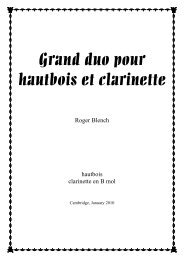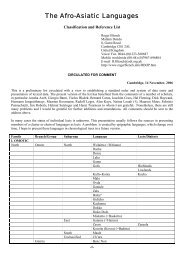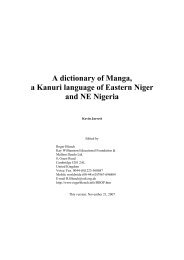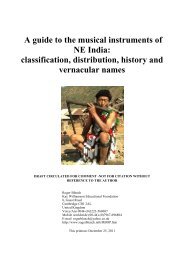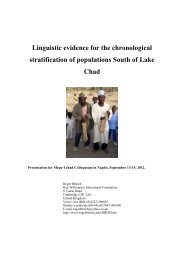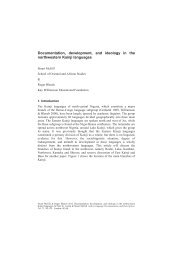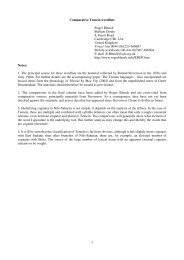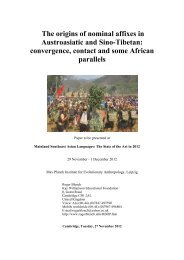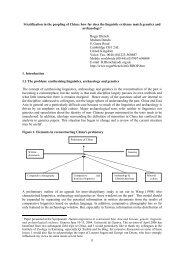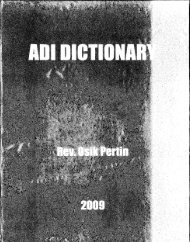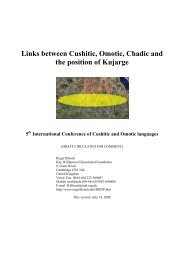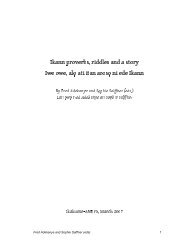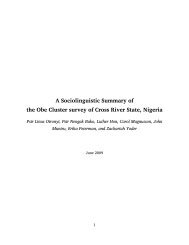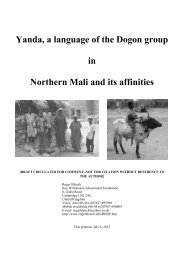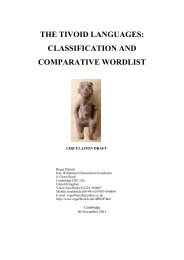Imperial grammar.pdf - Roger Blench
Imperial grammar.pdf - Roger Blench
Imperial grammar.pdf - Roger Blench
You also want an ePaper? Increase the reach of your titles
YUMPU automatically turns print PDFs into web optimized ePapers that Google loves.
<strong>Roger</strong> <strong>Blench</strong>: <strong>Imperial</strong> <strong>grammar</strong> and grassroots categories Circulation draft<br />
6. Parallel speech<br />
6.1 Arcane and ritual speech<br />
Photo 1. Tarok masquerade, Langtang<br />
Many languages have archaic and ritual forms which are<br />
applied in specific contexts. ‘Secret’ languages are common,<br />
often in the context of initiation or similar life-cycle<br />
ceremonies. Leiris (1948) may be one of the first detailed<br />
descriptions of a male secret language among the Dogon in<br />
Mali. Ittmann (1972) sketches the liengu, an intercultural<br />
language shared by several different ethnolinguistic groups in<br />
the region of Mount Cameroun and used by women who<br />
become ‘mermaids’. The Sierra Leone/Liberia region is<br />
particularly rich in complex and secretive symbolism (e.g.<br />
Murphy 1980; Bellman 1984). Power (2000) has reviewed the<br />
use of secret languages within female initiation cycles in<br />
Africa, which she relates to creating bounded communities,<br />
which in turn she gives a sociobiological interpretation. These<br />
languages are almost always substitution languages, where the<br />
<strong>grammar</strong> of the source language is retained and words are<br />
borrowed or periphrases constructed to indicate a specific item<br />
in the lexicon. Sometimes their lexicon can borrow from quite<br />
unrelated languages or else simply substitute new meanings<br />
for words already existing in the language. Interethnic languages like the Cameroun liengu or the Central<br />
African labi start to become alien when shared between languages which are only tenuously related.<br />
The boundary maintenance these languages are supposed to promote is often not very effective. Indeed one<br />
aspect of these ‘secret’ languages is that they are not very secret. In fact, they are often known to noninitiates,<br />
which suggests their function is more that of theatre, to dramatise the barrier they theoretically<br />
represent. So they create boundaries by their status as ‘secret’ rather than their actual secrecy. Trade jargons<br />
are probably much more functionally secret, since they are actually intended to conceal the nature of<br />
transactions.<br />
The Tarok of East-Central Nigeria have a powerful ancestor society, the orim, controlled by men. Those<br />
involved in the society speak in a substitution code, referring to certain classes of object with special terms.<br />
The main categories are;<br />
a) Food and drink items. These are used to indicate to women the food they should bring either for the<br />
dead, or to make good unacceptable behaviour<br />
b) Persons. These are coded ways of speaking about women when they are present at a masquerade<br />
c) Weapons. Used in discussing warfare and military matters.<br />
d) Household items. Used in discussions when women may be present<br />
e) Ritual items. Used to conceal meanings from men not fully initiated<br />
As can be seen, these have different contexts of use. Words for persons can be spoken in front of women but<br />
they are not supposed to know their meaning. By contrast, the words for food and drink are spoken to<br />
women who evidently must know the meaning in this context as these are instructions about food they<br />
should bring. Other orìm lexicon is intended to be used in front of uninitiated individuals to keep ritual<br />
matters secret. Table 15 shows a sample of Tarok orim vocabulary, with the literal translation, the item to<br />
which it applies and the ‘normal’ Tarok word for that item.<br />
12



